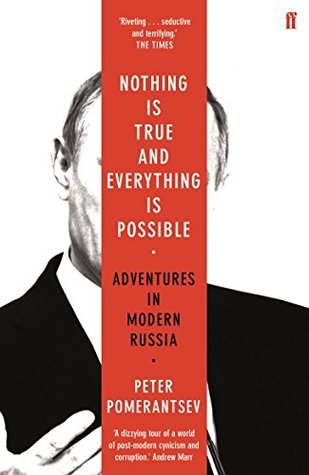More on this book
Community
Kindle Notes & Highlights
Read between
December 29, 2022 - January 15, 2023
No matter that I had never been more than a third-rate assistant on other people’s projects; just whispering ‘I come from London’ could get me any meeting I wanted.
But though my road would eventually lead back to Ostankino, my initial role in the vast scripted reality show of the new Russia was to help make it look and sound and feel Western.
It’s the reverse of the situation in the West, where politicians try to act like upstanding citizens while films and TV shows are obsessed with the underworld; here the politicians imitate mobsters but the films are rosy.
I remember finding myself in such a bar on a brief visit to Kaliningrad. The light in the bar was a murky, Baltic Sea green. I ordered a cognac. ‘A local one?’ asked the waitress. ‘What sort of grapes grow in Kaliningrad?’ I asked, not disingenuously. ‘Why would you need grapes for cognac?’ asked the waitress.
On the surface most Russian TV channels are organised like any Western TV station. Independent production companies pitch programme ideas to the network in what looks like open competition. But there is a twist. Most of the production companies, I soon realised, were either owned or part-owned by the heads of the network and senior execs. They were commissioning for themselves.
Of course they all wondered whether RT would turn out to be a propaganda channel.
those who are so ideologically driven by their hatred of the West they don’t notice (or don’t care) how they are being used; those so keen to be on TV they would work anywhere, or those who simply think, ‘Well, all news is fake, it’s all just a bit of a game – isn’t it?’
‘Over the last twenty years we’ve lived through a communism we never believed in, democracy and defaults and mafia state and oligarchy, and we’ve realised they are illusions, that everything is PR.’ ‘Everything is PR’ has become the favourite phrase of the new Russia; my Moscow peers are filled with a sense that they are both cynical and enlightened.
Something similar has happened to the Russian elites: during the Soviet period they learned to dissimulate in order to survive; now there is no need to constantly change their colours, but they continue to do so out of a sort of dark joy, conformism raised to the level of aesthetic act.


